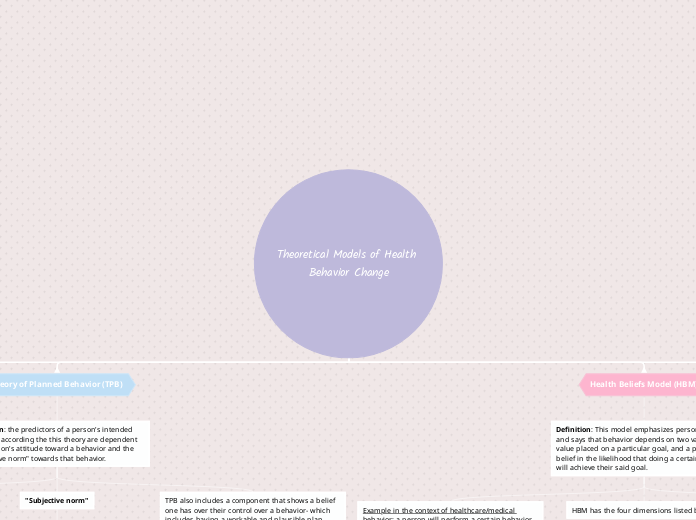von Cara Muenzler Vor 2 Jahren
181
Theoretical Models of Health Behavior Change

von Cara Muenzler Vor 2 Jahren
181

Mehr dazu
Contemplation: a person is intending a change towards a behavior in the next 6 months.
Preparation: a person intends to take an action in the immediate future and need to learn skills to do so.
Action: a person is currently making a specific behavior change and needs support to continue.
Maintenance: a person's new behavior becomes a habit and requires less effort to maintain the habit.
Termination: a behavior is now permanently ingrained in a person's routine.
Perceived susceptibility: one's perception of the risks and likelihood that they may contract an illness or condition.
Perceived severity: or feelings of the seriousness of catching an illness or not treating it- low seriousness may prove low motivation in a person while high seriousness could spark action towards a behavior to act towards preventing the illness/condition.
Perceived benefits: beliefs regarding the effectiveness an action may have on preventing or reducing the consequences/symptoms of a disease.
Perceived barriers: or potential negative outcomes of a health action that may act as blocks towards performing said behavior.
"TPB posits that when attitudes and subjective norms are favorable, and perceived control is high, strong intention to perform the behavior should result."
How an individual thinks others may perceive the behavior.
How motivated the individual is to comply with the beliefs or opinions others have on the behavior.
Likelihood and desirability of the outcome that comes from doing the behavior.
"Efficacy Expectations": "Beliefs about how capable one is of performing the behavior that leads to those outcomes." Efficacy expectations derive from four major sources listed below:
"Performance accomplishments": learning through personal experiences, building efficacy by doing a behavior and learning from it.
"Vicarious experience": learning the behavior by observing other people or models be successful in said behavior.
" Verbal persuasion": encouragement from oneself or another person/source.
"Physiological state": different physiological effects that are produced from thinking about or doing the behavior
"Outcome Expectations": "Beliefs about whether given behaviors will lead to given outcomes."
Subtopic